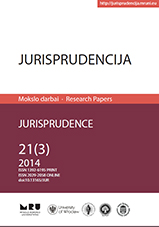ADVOKATO NEPRIKLAUSOMUMAS TEISINIŲ PASLAUGŲ RINKOS KOMERCIALIZACIJOS KONTEKSTE: RELIKTAS AR BŪTINYBĖ?
THE PRINCIPLE OF LAWYER’S INDEPENDENCE IN THE CONTEXT OF COMMERCIALIZATION OF THE LEGAL MARKET: REMNANT OR NECESSITY
Author(s): Julija KiršienėSubject(s): Law, Constitution, Jurisprudence
Published by: Mykolas Romeris University
Keywords: principle of lawyer’s independence; the legal profession; legal market liberalization; alternative business structure; lawyers; notaries; bailiffs
Summary/Abstract: The lawyer’s professional independence is considered to be the core principle of the profession. It is often used as defense against the state intervention in the regulation of lawyers. However, drivers in the legal market, such as an increase in competition, concentration of lawyers in large law firms, as well as the globalization, development of information technologies and social networks, which influence the commoditizing of the law and consumer awareness, certainly have shaken up the foundations of the legal profession and require the renewed approach to seemingly immovable values of the profession, including the principle of lawyer’s independence. Hence, the goal of the article is to answer the question whether this principle is still valid in the context of commercialization of the legal market. The first part of the article analyzes the dimensions of the principle of lawyer’s independence, i.e. independence from the state, from the client and other influences, by comparing continental and common law systems. The second part reveals how different approaches to the role of the lawyer influence the realization of this principle in legal regulation and practice. The third part is devoted to the analysis of radical changes in the legal market and new forms of legal services, such as incorporation of law firms, that affect the devaluation of the principle of lawyer’s independence. The article justifies that the lawyer’s independence from the state is realized primarily through strong self-governance and independence of the bar, but the trends in common law countries show that legal professional associations have lost their previous positions, especially in the area of self-disciplining, as they were not able to cope effectively with customers (clients) complains. In addition, the legal market liberalization reforms in Australia and the UK, which enable outside capital invest into law firms, have a tendency to expand to other jurisdictions. Changes in capital ownership structure of legal firms can change the governance and decision-making processes that may lead to the devaluation of the principle of lawyer’s independence yielding to the idea of entrepreneurship.
Journal: Jurisprudencija
- Issue Year: 21/2014
- Issue No: 3
- Page Range: 683-706
- Page Count: 24
- Language: Lithuanian

